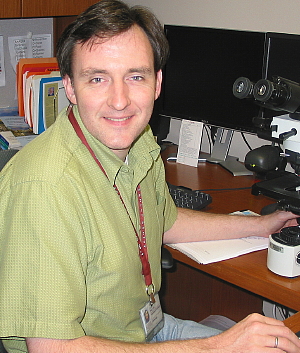Alexander Lazar, MD, PhD
 Dr. Lazar was born in Santa Ana, California. After obtaining dual degrees in philosophy and political science as an undergraduate at Austin College, he entered the NIH-sponsored Medical Scientist Training Program at UT Southwestern in Dallas, Texas. His dissertation there involved the study of basic heterotrimeric G-protein linked and lipid signaling pathways with Drs. Paul Sternweis and Al Gilman. He completed Anatomic Pathology residency at Brigham and Women’s Hospital / Harvard Medical School in Boston, Massachusetts and fellowships in Soft Tissue Pathology with Chris Fletcher and Dermatopathology there and at Massachusetts General Hospital. His postdoctoral research there involved studies of the Wnt signaling pathway in multiple neoplastic systems.
Dr. Lazar was born in Santa Ana, California. After obtaining dual degrees in philosophy and political science as an undergraduate at Austin College, he entered the NIH-sponsored Medical Scientist Training Program at UT Southwestern in Dallas, Texas. His dissertation there involved the study of basic heterotrimeric G-protein linked and lipid signaling pathways with Drs. Paul Sternweis and Al Gilman. He completed Anatomic Pathology residency at Brigham and Women’s Hospital / Harvard Medical School in Boston, Massachusetts and fellowships in Soft Tissue Pathology with Chris Fletcher and Dermatopathology there and at Massachusetts General Hospital. His postdoctoral research there involved studies of the Wnt signaling pathway in multiple neoplastic systems.
Dr. Lazar is currently an Associate Professor at The University of Texas M.D. Anderson Cancer Center in Houston, Texas. His clinical work there focuses on the diagnosis of bone and soft tissue tumors and solid tumor molecular testing, currently focused on next generation based sequencing for therapeutic selection and triage to clinical trials. As founding Director of the ACGME accredited Soft Tissue Pathology Fellowship Program, he is training the next generation of bone and soft tissue pathologists and translational researchers. His research has centered on the molecular characteristics of many sarcoma types for use in diagnosis, correlation with clinical outcome and searching for novel therapeutic interventions with colleagues such as Dr. Keila Torres in the multidisciplinary Sarcoma Research Center. This work is published in more than 250 peer-reviewed manuscripts, book chapters, and books edited.
As Senior Associate Editor of Laboratory Investigation and as a member of additional editorial boards, Dr. Lazar is deeply committed to the peer review and publication process. He has leadership positions within the American Joint Committee on Cancer (AJCC) for sarcoma staging and the College of American Pathologists (CAP) with oversight of the protocols for defined pathology reporting of sarcomas, including molecular diagnostics. He participated in producing the 2013 World Health Organization (WHO) classification system for bone and soft tissue tumors. As a result of this collaborative work with numerous colleagues, these three systems are now completely aligned, creating a uniform system for the diagnosis, reporting and staging of sarcomas used and adapted throughout the world.
It now seems to take a village to accomplish much of the important translational research in sarcoma. Dr. Lazar's current team science involvement includes directing the Pathology Research Core for the Sarcoma Alliance for Research through Collaboration (SARC) Sarcoma SPORE, one of the two funded by the NIH. He helps to lead The Cancer Genome Atlas project for sarcoma, also funded by the NIH, which is exploring and will define the genomic features of several sarcoma types and fuel additional studies to understand sarcomagenesis. Additional sarcoma genomic analyses are underway at MD Anderson in collaboration with Dr. Andy Futreal and others.
Dr. Lazar has been involved with the Liddy Shriver Sarcoma Initiative for several years. He spoke on a series of videos on sarcoma pathology for the Initiative and has published ESUN articles about sarcoma molecular diagnostics and the 2013 WHO Bone and Soft Tissue classification system. He is a regular reviewer of submitted grants and editorials and is a principal investigator on the Initiative's International Consortium on Myxoid Liposarcoma, which is a team science effort involving researchers from Canada, the Netherlands, and the USA.
Copyright © 2014 Liddy Shriver Sarcoma Initiative.